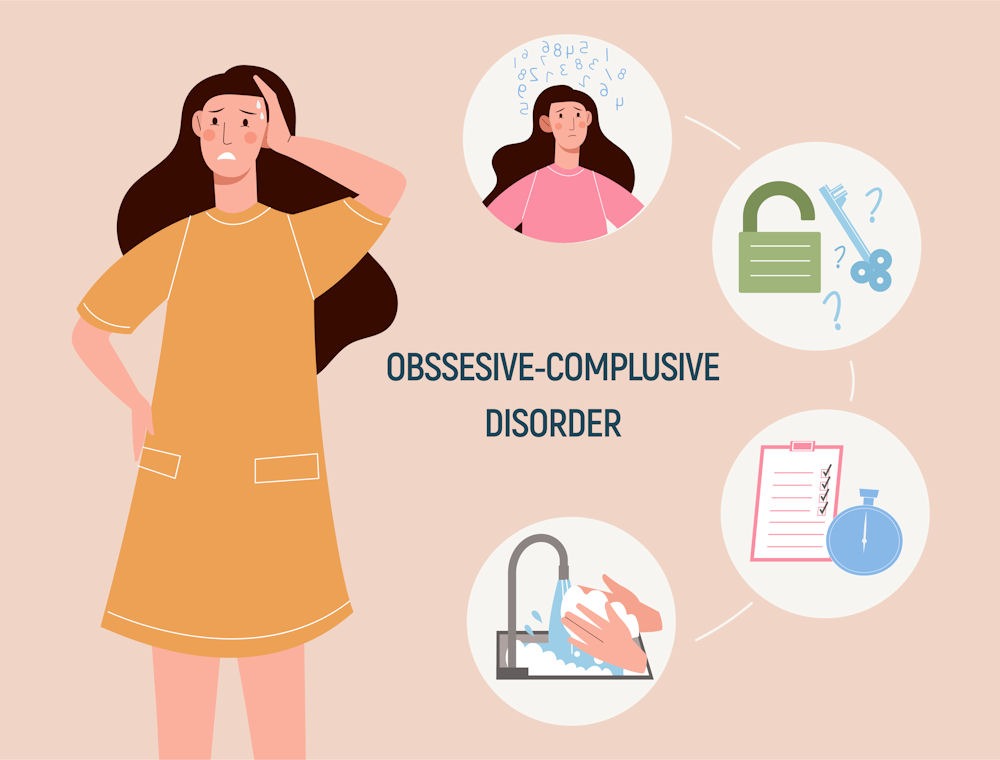Living with a mental health disorder is the farthest thing from convenient. This is especially true with a disorder like obsessive compulsive disorder (OCD). Although OCD diagnoses are most often self-appointed, there are far more individuals who deal with it than they realize. If this is the case, how do you recognize OCD? Also, is there treatment available for those who really struggle?
First City Recovery offers a mental health residential stabilization program and a mental health PHP for individuals dealing with mild to severe mental health issues.
The primary symptoms of OCD include the following:
- Recurrent and persistent thoughts, feelings, ideas, sensations
- Behaviors that lead to distress or impairment
- Fear of contamination by germs or dirt
- Excessive concerns about order and symmetry
- Aggressive thoughts towards self or others
- Doubts about decisions
- Intrusive sexual thoughts
- Skin picking
- Hoarding
These obsessions and compulsions can interfere with daily activities such as work, school, and relationships. Common types of compulsions include the following:
- Repeated checking
- Counting or ordering rituals
- Cleaning rituals
- Demanding reassurance that certain things are true
People develop OCD in different ways, but the condition is believed to be caused by a combination of genetic, environmental, and psychological factors. Genetics may play a role in developing OCD as the disorder tends to run in families. The environment can also influence the development of OCD; for instance, stressful life events such as abuse or trauma can trigger symptoms of OCD.
In addition, certain cognitive and behavioral processes can contribute to OCD; for example, some people may develop an exaggerated sense of responsibility or be overly concerned with avoiding mistakes, which can lead to obsessions and compulsions.


Are OCD and OCPD Related?
Although OCD and OCPD may have some similar traits, the two disorders differ in their causes, treatment approach, and overall outcomes. People with OCD often respond well to cognitive behavioral therapy (CBT) and/or antidepressant medications.
OCPD, on the other hand, is better treated with psychotherapy that focuses on changing thought patterns and behaviors. It is also important to address any underlying issues such as low self-esteem or difficulty dealing with conflict.
What is OCPD?
Obsessive Compulsive Personality Disorder (OCPD) is a mental health condition characterized by an inflexible adherence to rules, orderliness, and perfectionism. People with OCPD often struggle to find the balance between work and leisure activities, as they prefer to prioritize work over social interaction and other activities. They tend to be overly conscientious, rigid, and detail-oriented, often to the point of being unable to relax or find satisfaction in their accomplishments.
People with OCPD may also struggle with perfectionism, leading to difficulty completing tasks due to fear of not reaching their high standards. They may also be overly focused on adhering to rules and schedules which can lead them to be inflexible and unable to adjust when unexpected changes occur.
Additionally, people with OCPD may display difficulty making decisions, perfectionistic tendencies, and intense feelings of inferiority which can lead to problems in interpersonal relationships. Treatment for OCPD generally involves cognitive behavioral therapy (CBT) and/or medications such as SSRIs or mood stabilizers.
Why Do People Misdiagnose Themselves With OCD?
In addition, many people have difficulty distinguishing between obsessive thoughts and compulsive behaviors, which can lead to self-diagnosis of OCD. Obsessive thoughts are defined as intrusive and unwanted ideas or impulses that cause anxiety, while compulsive behaviors are defined as repetitive and ritualistic. It’s important to remember that both obsessive thoughts and compulsive behaviors can be present in varying degrees, or even just one or the other, without it being an indication of OCD.
OCD is a complex disorder that often causes significant distress, so if you think you may be struggling with OCD, it’s important to seek professional help. First City Recovery Center can provide an assessment for OCD and create a treatment plan that works best for you. Treatment options may include cognitive-behavioral therapy (CBT), medication, or both; this depends on the severity of symptoms and the individual’s preferences.
How Many People Have OCD in Indiana?
How Often are Mental Health Disorders Undiagnosed?
Approximately 1 in 40 adults, or 2.3% of the population, live with Obsessive-Compulsive Disorder (OCD). However, many people with OCD have not been diagnosed and are unaware that their symptoms could be a problem. In fact, it is estimated that only around one-third of those with OCD receive treatment, leaving many people living with this disorder undiagnosed and untreated.
The lack of diagnosis and treatment for OCD is concerning because it can have a major impact on an individual’s quality of life. People with OCD often feel isolated, ashamed, and helpless due to their inability to control their intrusive thoughts and compulsions. This can lead to depression, anxiety, and other mental health issues. Additionally, OCD can interfere with the ability to work or complete everyday tasks.
Mental health disorders can often go undiagnosed because they are not always visible and symptoms may be difficult to recognize. Many people who experience mental health issues are reluctant to seek help due to the stigma associated with mental illness. Unfortunately, this means that mental health disorders often go untreated and can become worse if left unaddressed.
As a result, it is important to recognize the signs of mental health issues and seek help if necessary. A trusted doctor or mental health professional can accurately diagnose a mental health disorder and provide treatment options to help manage symptoms. Early diagnosis often leads to faster recovery, so it is important to seek help as soon as possible.
Is OCD Debilitating?
People with OCD may find that their thoughts and behaviors take up an excessive amount of time and energy, making it difficult to focus on other tasks or activities. This can lead to problems in work, school, relationships and social interactions. Additionally, people with OCD may feel ashamed or embarrassed of their behavior, leading to feelings of isolation and low self-esteem.
What is it Like to Have OCD?
A common symptom of OCD is an overwhelming urge to perform rituals or routines in order to relieve anxiety. These compulsions can include excessive washing, counting, checking, or organizing of items. People with OCD may also experience persistent intrusive thoughts that are difficult to ignore and cause distress. Examples of these types of intrusive thoughts may include fear of causing harm to oneself or others, religious guilt, and thoughts about taboo topics.
What sort of Treatment is Available for OCD?
Psychotherapy is also an important component of treatment for OCD, as it helps patients understand their obsessive thoughts and develop ways to manage them. Cognitive Behavioral Therapy is one of the most common types of therapy used to treat OCD, as it helps patients recognize their irrational fears and beliefs and challenge them.
Exposure Response Prevention (ERP) is another type of therapy that involves gradually exposing the patient to a feared stimulus while learning how to cope with anxiety in a healthy way. Medication and psychotherapy can be effective treatments for OCD, but it is important to remember that recovery takes time and involves developing new habits and ways of thinking. It is important to find a mental health professional who is knowledgeable about the disorder and can provide guidance and support throughout treatment.


















